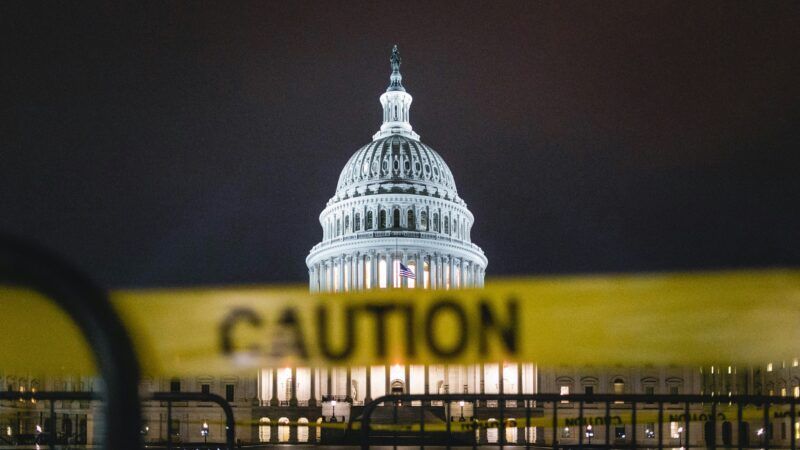The House GOP Budget Blueprint Promises More Borrowing, More Debt, and Not Enough Spending Cuts
"If the Republican budget passes, the deficit gets worse, not better," says Rep. Thomas Massie. He's right.

Two months ago, President Donald Trump promised that Congress would "cut Hundreds of Billions of Dollars in spending next year through Reconciliation!"
Two weeks ago, Trump seemingly doubled down: "BALANCED BUDGET!!!" he declared in an all-caps post on Truth Social that, in fairness, could be seen either as a demand for such a thing—or an expression of outrage at the idea.
Perhaps House Republicans believe it to be the latter.
On Tuesday, Congress is set to vote on a budget resolution that will pave the way for trillions of dollars in additional borrowing over the next 10 years and will accelerate the pace at which the national debt is growing. It will not, as should be obvious, balance the budget.
"If the Republican budget passes, the deficit gets worse, not better," Rep. Thomas Massie (R–Ky.) posted to X on Monday night.
The resolution does instruct various House committees to come up with about $2 trillion in budget cuts that would be spread out over the next 10 years. Those proposed spending cuts, however, will be swamped by $4.5 trillion in new deficits that the resolution assigns to the House Ways and Means Committee as a placeholder for the eventual extension of the 2017 tax cuts.
This bill is just a blueprint, which means any specific spending cuts and the details of the extended tax cuts—including vital things like future rates and whether the extension is permanent or temporary—will be determined later, and the specific spending and tax cut figures will likely change as those specifics are nailed down. Still, the tradeoff that this bill would establish is not an encouraging sign.
Of course, allowing Americans to keep more of their hard-earned income by extending the 2017 tax cuts is a good idea. If those tax cuts expire, nearly everyone will owe the government a bigger cut (as I explained in greater detail in the January 2025 issue of Reason).
Even so, prudent budgeting requires that tax cuts be offset with equal (or greater) reductions in spending. Doing otherwise is a promise to borrow funds to fill the inevitable gap in the budget—which means the tax cuts are an illusion, since that borrowing will have to be paid back, plus interest, with future taxes.
Tax cuts that are not offset with spending cuts would be fiscally irresponsible even if the federal government hadn't already piled up more than $28.8 trillion in debt held by the public. It is utterly insane in the current environment.
If Congress passes this budget blueprint and follows through with it when passing new spending and tax cuts, it would add $3.4 trillion to the debt over the next 10 years, according to an estimate by the Committee for a Responsible Federal Budget. That means the federal government would be accumulating debt at an even faster rate than it already is, and the debt held by the public would hit 125 percent of gross domestic product (GDP) by the end of the decade, rather than the current pace of 117 percent of GDP.
"Lawmakers should amend it to require that deficits be reduced rather than allow for trillions of dollars of new debt," the committee argues.
(The budget blueprint attempts to paper over some of that future borrowing by promising explosive economic growth over the next 10 years. That's an unrealistic, gimmicky assumption that should not be taken seriously.)
Despite the insufficient spending cuts and the implicit promise to borrow more heavily, some moderate Republicans are reportedly pushing to cut less. Of those $2 trillion in future spending cuts, the blueprint would assign about $880 billion of them to the House Energy and Commerce Committee—and the prevailing assumption is that most of those cuts would have to come from Medicaid, the joint federal-state program that provides health insurance for the poor.
Several Republicans sent a letter to Speaker of the House Mike Johnson (R–La.) warning that "slashing Medicaid would have serious consequences." Over in the other chamber, Sen. Josh Hawley (R–Mo.) has also criticized the potential Medicaid cuts that would be included in the House budget plan.
On Monday, Politico reported that Johnson would not amend the budget blueprint to appease those lawmakers.
That's at least one good sign. There are plenty of ways to cut spending from the parts of the budget overseen by that committee without throwing needy Americans off Medicaid. But it will require some serious policy changes, including asking states to pick up a relatively larger share of Medicaid costs—in effect, reversing policies by both Barack Obama and Joe Biden that asked federal taxpayers to shoulder a larger burden.
That, clearly, is a big ask for Johnson to make of his fellow Republicans. And $2 trillion in spending reductions over 10 years, on its own, would be a sizable, praiseworthy cut.
As a whole, however, the Republican budget blueprint is a fiscally irresponsible promise to borrow more and continue giving Americans a much more expensive government than the one they are paying for.


Show Comments (108)